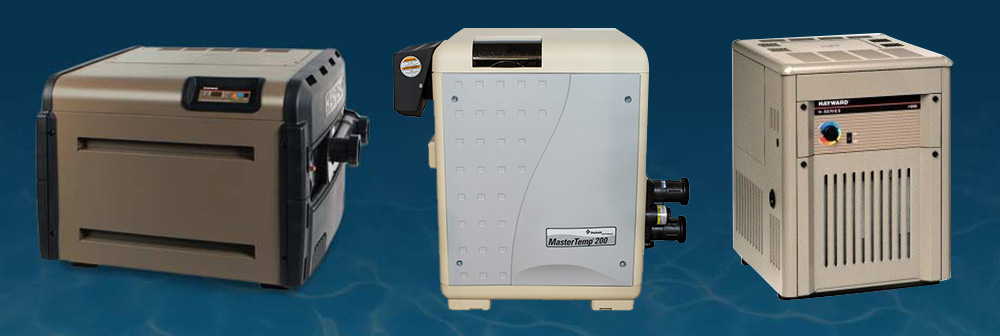What Size of Pool Heater do you Need?

Pool heaters allow you to open your pool earlier in the spring, and extend the swimming season well into the fall, but they are a large investment, so before running out to buy a pool heater you should spend a little bit of time doing research.
If you don’t choose the size of your pool heater carefully you could end up spending a lot of time and money down the line.
What you need to Consider
Before buying a pool heater there are five basic things that you need to determine:
- The size of your pool
- Your heating needs and preferences
- BTU requirements
- Whether or not you use a solar cover
- Environmental considerations
1) Size of your pool
The larger your pool, the more powerful your heater will need to be. To determine the size of your pool you need to calculate the volume. Follow the formulas in the chart below to calculate the volume of your pool:

2) Your needs and preferences
There are two basic ways to run a pool heater. You can either choose to heat from cold, or maintain a constant warm temperature.
Everyone will have to heat from cold at some point, so the main question is: how often do you want to heat your pool? Using your heater on a need-to-heat basis to tackle particularly chilly days is a real option, but it requires a more powerful heater to heat on demand. On the other hand, keeping your pool at a warm temperature day in and day out requires a smaller heater.
3) Know your BTUs
Pool heaters measure their power in BTU (British thermal units). To determine the correct size of pool heater you’ll need to do some math to determine the BTU capacity your pool will need.
The easiest way to calculate BTUs
Pool Supplies Canada has a great chart with some of the most common pool sizes, and estimated BTU requirements.
| Pool Size |
Gas Heater Size |
Heat Pump Size |
| 15 ft Round |
100,000 - 130,000 BTU |
50,000 - 70,000 BTU |
| 18 ft Round |
100,000 - 150,000 BTU |
50,000 - 70,000 BTU |
| 21 ft Round |
100,000 - 175,000 BTU |
50,000 - 85,000 BTU |
| 24 ft Round |
200,000 - 250,000 BTU |
50,000 - 110,000 BTU |
| 27 ft Round |
200,000 - 250,000 BTU |
100,000 - 120,000 BTU |
| 12 x 24 ft |
100,000 - 150,000 BTU |
70,000 - 85,000 BTU |
| 16 x 32 ft |
200,000 - 250,000 BTU |
110,000 - 120,000 BTU |
| 20 x 40 ft |
300,000 - 400,000 BTU |
120,000 - 140,000 BTU |
If your pool is an uncommon shape or size, you may need to estimate your BTU requirements yourself. Here’s how:
Determine BTUs needed to raise your pool’s temperature
One BTU raises the temperature of one pound of water by one degree Fahrenheit. There are 8.33 pounds of water per gallon. That means that if you have a swimming pool that holds 20,000 gallons, it requires 166,000 BTUs to increase by one degree. Then divide this number by 24 to find how many BTUs you need to raise the temperature by one degree over 24 hours.
For example, 166,000 BTUs ÷ 24 hours = 6,916.66.
Now, if you want to increase the temperature of your pool to 80 degrees then you need to subtract your current pool temperature from your desired pool temperature.
For example, 80°F (desired pool temperature) – 60°F (current pool temperature) = 20°F
Now multiply the BTUs per hour to raise the temperature by one degree by the number of degrees that you want.
For example, 6,916.66 BTUs per hour x 20°F = 138,133
This is how many BTUs you would need per hour to raise the temperature by 20 degrees over 24 hours. In our example above, the pool heater would need to have at least 138, 133 BTU capacity to adequately heat the pool.
To heat a pool more quickly you’ll need to increase the BTUs.
It is a good idea to overestimate your heating needs by about 20% to account for environmental factors and natural heat loss caused by evaporation.
Determine BTUs needed to maintain your pool’s temperature
Maintaining your pool’s temperature is just as important as heating it in the first place. To maintain the temperature, you need about 10 BTUs per hour, per square foot of surface, per degree above the air temperature.
That means keeping a pool with a surface area of 300 square feet at 80 °F 60 °F weather would require 60,000 BTU per hour.
Here’s the math:
Multiply 20 (the difference in temperature between the desired temperature and air temperature) by 300 (the surface area of the pool) = 6,000
Then, 6,000 is multiplied by 10 (the number of BTUs required per hour per square foot) for a total of 60,000 BTUs per hour.
To heat your pool by 20 degrees in just 12 hours (i.e. half the time), multiply the number of BTUs per hour by two. In our example this means that to heat your pool by 20 degrees in 12 hours you would need a heater with a capacity of 120,000 BTUs per hour.
4) Do you use a solar cover?
Using a solar cover in addition to your pool heater will reduce the amount of time and energy your heater needs to warm your pool and will keep the water warmer for longer. A solar cover used in conjunction with a heater can reduce the BTUs needed to heat or maintain your pool temperature by 50%-80%.
Shop All Solar Covers
5) Environmental considerations
Most pool heaters are environmentally friendly. Natural gas heaters and propane heaters are more efficient than earlier models and are far more efficient than an oil furnace, for example. Heat pumps are even more environmentally friendly than gas and propane, and solar heaters are by far the most affordable to operate and are the most environmentally friendly option (but also the least powerful).
As is so often the case you will have to make a choice between efficiency and power. Choosing the latter may mean you get a few less weeks of pool timer per year, but you can also pair a solar heater with a gas heater and switch between the two to find the right balance of comfort while minimizing your footprint and your energy bill.
Choosing your heater – Which type of heater is best?
When it comes to choosing the right pool, heater erring on the side of caution means going with the more powerful option. Calculating BTUs is not an exact science, the calculations depend on a completely stable temperature (not something you find often in the Canadian fall and spring) plus you have to take into consideration natural heat loss through evaporation.
Natural gas and propane heaters are generally the most powerful, followed by electric heaters (heat pumps) which are less responsive, less powerful, and usually require temperatures in excess of about 50 degrees °F or 10 °C to operate. Solar heaters are the most environmentally friendly option but lack the raw heating power of gas, propane or electrical units. There are also several pool heater accessories to enhance your overall pool heating experience.
Looking for help determining the right size of pool heater for your pool? The experts at Pool Supplies Canada can help you do the math and recommend the best heater to meet your needs. Give us a call today to get started.
This Blog was Posted on January 2nd, 2019
Any Offers, Prices or Product Line Ups Mentioned on this Page are Subject to Change Without Notice



